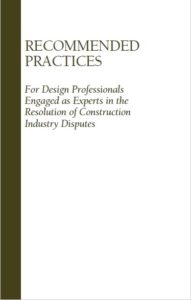Expectations Management: New GBA Publication Gives Guidance about Underpromising in Order to Overdeliver
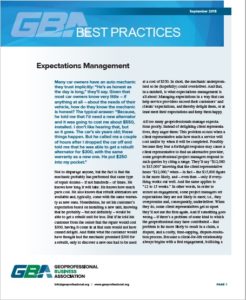
Expectations management is something that all too many geoprofessionals have not yet mastered. They need to. According to Expectations Management – the newest addition to the Geoprofessional Business Association’s (GBA’s) series of GBA Best Practices monographs – “All too many geoprofessionals manage expectations poorly….The problem occurs when a client representative asks how much a service will cost and/or by when it will be completed. Possibly because they fear a forthright response may cause a client representative to find an alternative provider, all too many geoprofessional project managers respond to such queries by citing a range. They’ll say ‘$12,000 to $15,000’ knowing that the client representative hears ‘$12,000,’ when – in fact – the $15,000 figure is far more likely, and – even then – only if everything works out well. And the same applies to ‘12 to 15 weeks.’ In other words, in order to secure an engagement, some project managers get into the unfortunate habit of setting expectations they are not likely to meet; i.e., they overpromise and then underdeliver.”
So, how should a geoprofessional project manager proceed? According to the new GBA Best Practices, experienced geoprofessional project managers “know about how long it will take to perform a given service, having performed it dozens – if not hundreds – of times before. They’re also aware of the other projects they’re working on and how much time will have to pass before they can start on the new one. In other words, they’re in a position to quote realistic budget and schedule ranges. In many cases, however, those ranges do not consider the unexpected, like an illness or accident that suddenly slows things down. As such, a truly realistic range that accounts for the potential for the unexpected…geoprofessionals the ability to delight, or at least satisfy, client representatives. If client representatives decide to rely on a different geoprofessional because they regard a realistic fee range as too high or a realistic delivery-date range as too long, so be it: The firm that commits to realistic ranges would likely get another chance to prove its mettle at some future time, especially so if the ranges cited by the alternative provider prove to be aspirational.” As the new publication also points out, “How much better it would be to let a client representative know that a commission will cost as much as $20,000 to fulfill, and/or that it will take as many as 20 weeks…and then deliver in 18 weeks and/or for $18,000.”
GBA Best Practices monographs are available only to GBA members, without charge. Members can order Expectations Management from the GBA website.
Established in 1969, the Geoprofessional Business Association is widely regarded as geoprofessionals’ best source of comprehensive business guidance. GBA serves geotechnical engineers, environmental professionals, civil engineers engaged in a variety of specialties, and construction-materials engineering and testing professionals, among other geoprofessionals. GBA is well known for its innovation; it was the force behind the limitation of liability contract provision, alternative dispute resolution, and organizational peer review, among other concepts it developed to help its member firms thrive by confronting risk and optimizing performance.
All GBA Member Firms’ technical activities are under the full-time control of an individual who is legally and/or ethically bound to hold paramount public health, safety, and welfare. GBA’s associate membership comprises geoprofessional constructors; geoprofessional educators; geoprofessionals employed by government agencies, not-for-profit organizations, and industry; and attorneys and other consultants to GBA Member Firms.
Obtain more information about GBA at its website (www.geoprofessional.org) or by contacting the organization at info@geoprofessional.org or 301/565-2733.
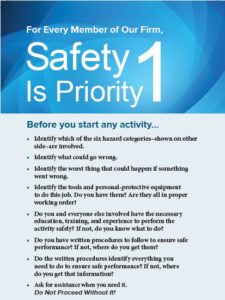
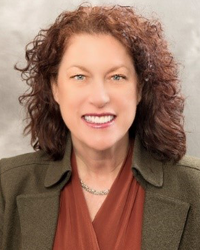
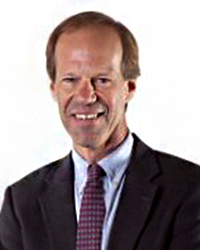
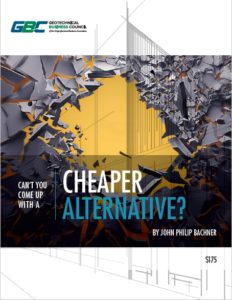
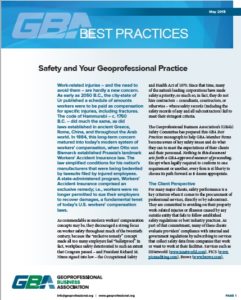
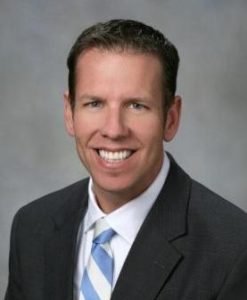
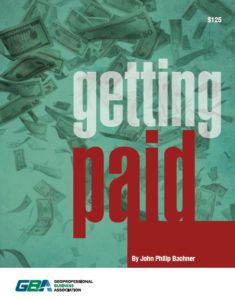 In an ideal world, design and environmental professionals’ bills would all be paid within 30 days. Recognizing that we do not live in an ideal world, the Geoprofessional Business Association (GBA) has developed a brief but comprehensive guide to getting paid. Titled Getting Paid, the new, 19-page guide comprises 21 chapters, each focused on a specific technique to achieve prompt payment while avoiding some clients’ efforts to avoid payment altogether, typically by filing a negligence claim.
In an ideal world, design and environmental professionals’ bills would all be paid within 30 days. Recognizing that we do not live in an ideal world, the Geoprofessional Business Association (GBA) has developed a brief but comprehensive guide to getting paid. Titled Getting Paid, the new, 19-page guide comprises 21 chapters, each focused on a specific technique to achieve prompt payment while avoiding some clients’ efforts to avoid payment altogether, typically by filing a negligence claim.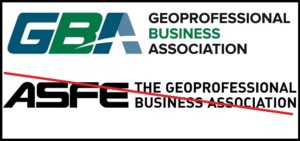 Geoprofessional Business Association (GBA) is the new name of the organization formerly known as ASFE/The Geoprofessional Business Association. According to GBA President Steven D. Thorne, P.E., D.GE (Terracon),
Geoprofessional Business Association (GBA) is the new name of the organization formerly known as ASFE/The Geoprofessional Business Association. According to GBA President Steven D. Thorne, P.E., D.GE (Terracon),